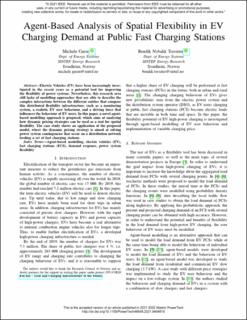| dc.contributor.author | Garau, Michele | |
| dc.contributor.author | Torsæter, Bendik Nybakk | |
| dc.date.accessioned | 2021-10-08T11:18:38Z | |
| dc.date.available | 2021-10-08T11:18:38Z | |
| dc.date.created | 2021-08-10T11:06:09Z | |
| dc.date.issued | 2021 | |
| dc.identifier.citation | 2021 IEEE Madrid PowerTech | en_US |
| dc.identifier.isbn | 978-1-6654-3597-0 | |
| dc.identifier.uri | https://hdl.handle.net/11250/2788709 | |
| dc.description.abstract | Electric Vehicles (EV) have been increasingly investigated in the recent years as a potential tool for improving the flexibility of power systems. Nevertheless, this research area still lacks of modelling approaches that are able to describe the complex interactions between the different entities that compose this distributed flexibility infrastructure, such as a monitoring system, a realistic EV user behaviour, and a driving force that influences the behaviour of EV users. In this paper, a novel agent-based modelling approach is proposed, which aims at analysing how dynamic pricing strategies can be used as a tool for spatial flexibility. The case study shows an application of the proposed model, where the dynamic pricing strategy is aimed at solving power system contingencies that occur on a distribution network feeding a set of fast charging stations. | en_US |
| dc.language.iso | eng | en_US |
| dc.publisher | IEEE | en_US |
| dc.relation.ispartof | 2021 IEEE Madrid PowerTech | |
| dc.title | Agent-Based Analysis of Spatial Flexibility in EV Charging Demand at Public Fast Charging Stations | en_US |
| dc.type | Chapter | en_US |
| dc.type | Peer reviewed | en_US |
| dc.description.version | acceptedVersion | en_US |
| dc.identifier.cristin | 1924957 | |
| dc.relation.project | Norges forskningsråd: 295133 | en_US |
| cristin.ispublished | true | |
| cristin.fulltext | postprint | |
| cristin.qualitycode | 1 | |
